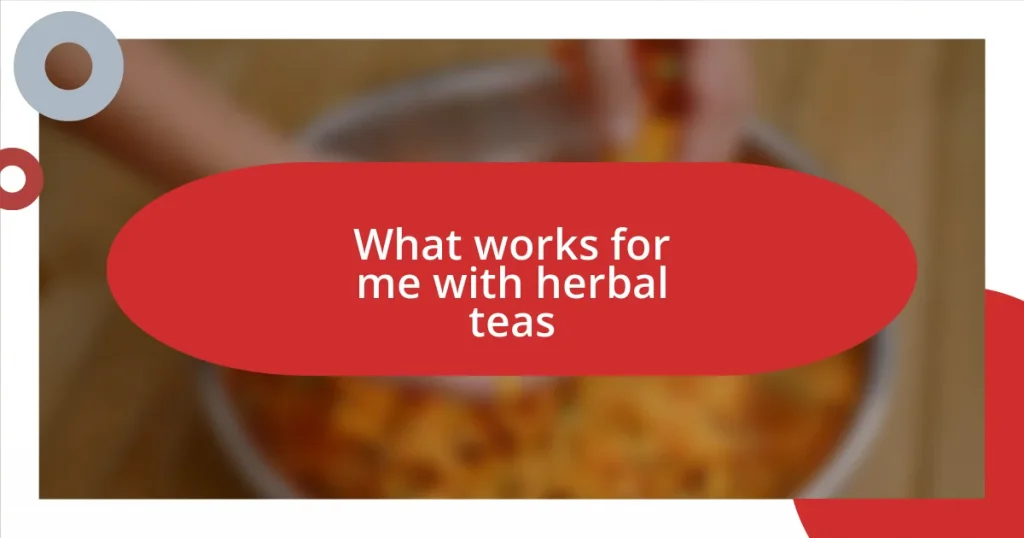Key takeaways:
- Herbal teas offer various benefits including relaxation, immune support, and digestive aid, influenced by the type of tea chosen.
- Choosing the right herbal tea involves considering personal mood and desired health effects, with combinations enhancing flavors and benefits.
- Common misconceptions include assuming all herbal teas are caffeine-free and that they can replace medication, while some blends can also stimulate creativity and focus.
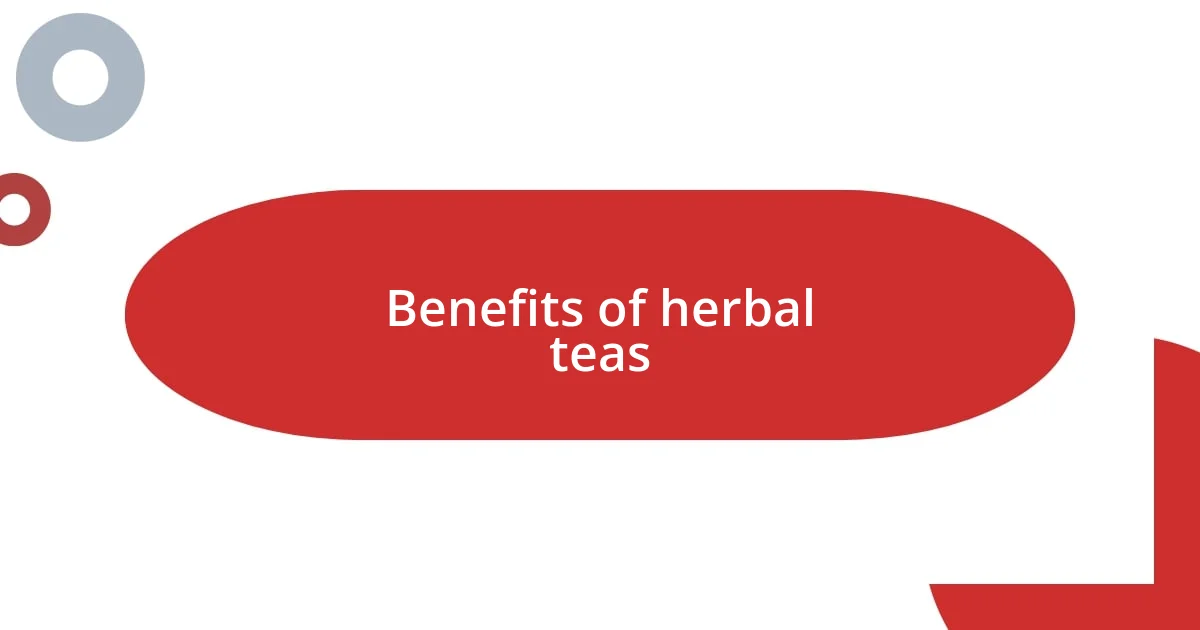
Benefits of herbal teas
Herbal teas have been my go-to for relaxation, especially after a long, stressful day. There’s something incredibly soothing about having a warm cup of chamomile or peppermint. I often wonder, isn’t it amazing how something so simple can ease tension and promote a sense of calm? In my experience, these little rituals do wonders for mental clarity and stress relief.
Moreover, many herbal teas are packed with antioxidants, which are beneficial for overall health. I remember when I started drinking ginger tea regularly; I noticed fewer colds that season. Isn’t it incredible how nature provides us with these potent remedies? The idea that a humble cup of tea can boost my immunity feels like a comforting hug for my body.
Finally, let’s not forget about the potential digestive benefits. I often sip on fennel tea after meals, and I can honestly say it makes a difference. Have you ever experienced that uncomfortable fullness after a big meal? Fennel tea has a way of settling my stomach, allowing me to feel light and comfortable again. It’s like a delicious, holistic remedy that’s always there when I need it.
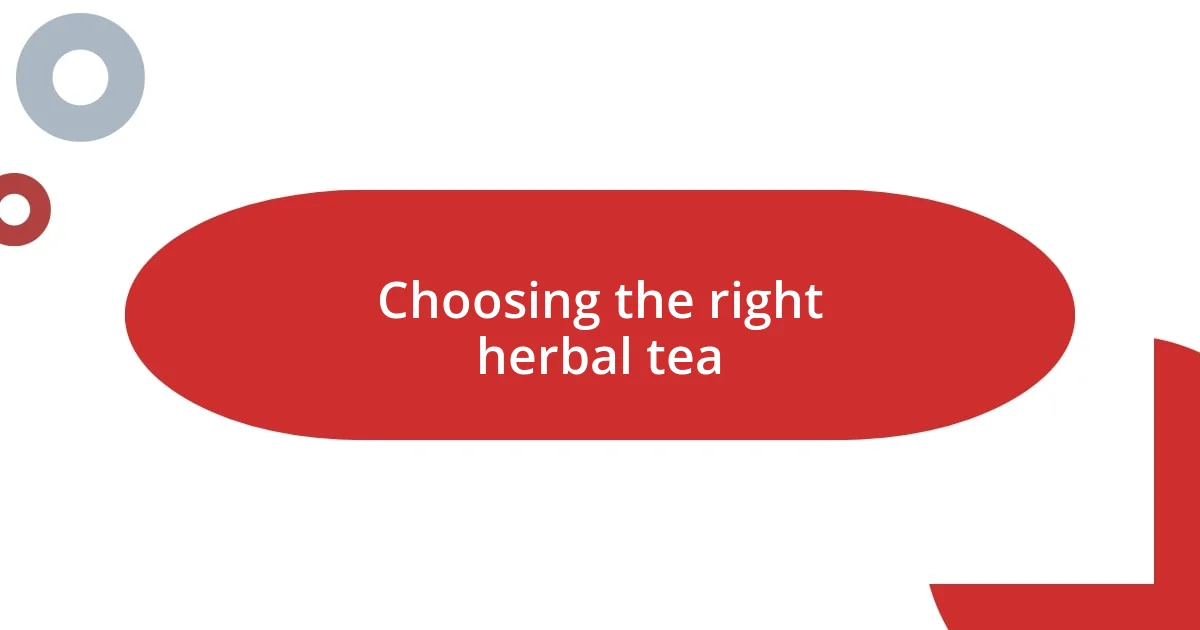
Choosing the right herbal tea
When it comes to choosing the right herbal tea, I find that it really helps to reflect on what I want to achieve with my tea ritual. Personally, I often opt for selection based on my mood. If I’m winding down in the evening, I’ll reach for chamomile or lavender for their calming effects. However, on days when I need a bit of a pick-me-up, I tend to gravitate towards peppermint or hibiscus teas. Isn’t it interesting how our moods can influence our choices?
Another essential factor is understanding the health benefits associated with different herbs. For instance, when I was battling some seasonal allergies, I found myself reaching for nettle tea, which helped alleviate those annoying symptoms. This experience made me realize that it’s not just about flavor; it’s also about how each herbal option can support our unique wellness goals. It’s fascinating how one cup can act as both a delight and a remedy.
I’ve also learned to experiment with combinations. One evening, I mixed ginger and turmeric tea, hoping to boost my immune system. The warmth and spiciness were invigorating, leaving me feeling rejuvenated. Have you tried blending different herbal teas? It may just unlock a whole new world of flavors and benefits for you!
| Herbal Tea | Benefits |
|---|---|
| Chamomile | Promotes relaxation and aids sleep |
| Peppermint | Helps with digestion and refreshes |
| Ginger | Supports immunity and alleviates nausea |
| Hibiscus | Rich in antioxidants and may lower blood pressure |
| Fennel | Relieves bloating and aids digestion |
| Nettle | Helps alleviate allergy symptoms |
| Turmeric | Anti-inflammatory properties and supports joint health |
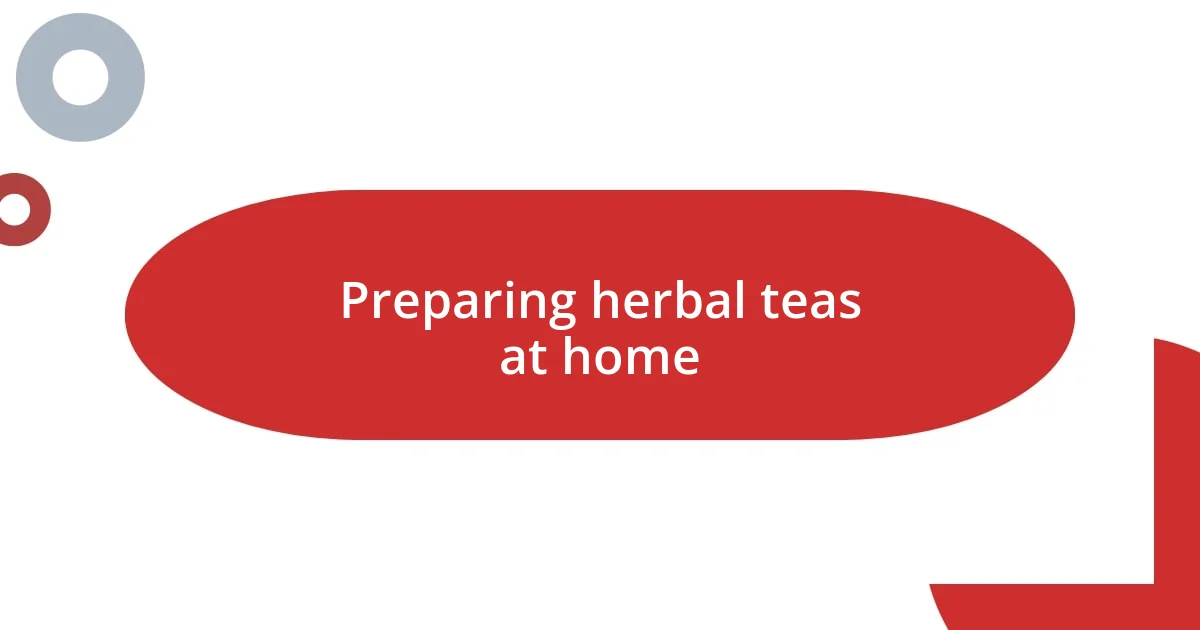
Preparing herbal teas at home
Preparing herbal teas at home
Preparing herbal teas at home allows you to customize the experience based on your preferences. I remember the first time I gathered fresh herbs from my garden—a handful of mint and a few sprigs of rosemary. The aroma was so invigorating! It reminded me that the right preparation can elevate your tea-drinking ritual into a delightful sensory experience.
Here’s my simple process for making herbal tea that feels special every time:
- Select your herbs: Choose fresh or dried herbs based on your mood or desired effects.
- Measure the amount: I typically use about one tablespoon of fresh herbs or one teaspoon of dried herbs per cup of water.
- Boil water: Bring your water to a boil, but if you’re using delicate herbs, let it cool slightly to avoid scorching.
- Steep wisely: Pour the hot water over the herbs and let them steep. I usually steep mine for 5-10 minutes for full flavor.
- Strain and enjoy: Use a strainer to separate the herbs from your tea, then sip and relish the warm comfort.
This method is so straightforward, yet it feels like a little magic in my kitchen. When I make a cup this way, I find myself savoring the moment, as each sip evokes a sense of self-care and warmth. What about you? Do you have a favorite way to prepare your own herbal tea at home?
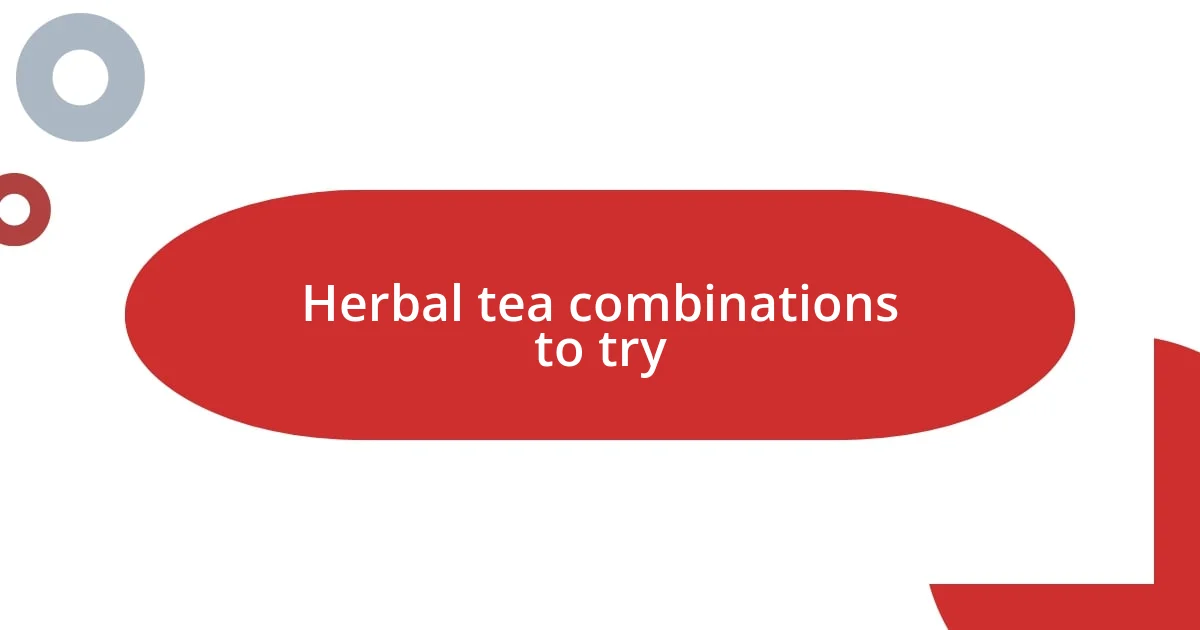
Herbal tea combinations to try
One combination I adore is lemongrass and ginger. The zesty flavor of lemongrass perfectly balances the spiciness of ginger, creating a refreshing yet warm brew. I remember sipping this blend on a rainy afternoon, feeling the vibrant citrus notes lift my spirits while the ginger added a comforting warmth. It’s amazing how certain flavors can transport you to different moments, isn’t it?
Another fantastic mix I’ve tried is fennel and peppermint. Each time I brew this combination, I’m reminded of the herbal tea my grandmother used to prepare for me after family meals. Fennel helps with digestion, and peppermint adds a cooling touch. This duo not only soothes my tummy but also evokes fond memories of gathering around the dinner table. Have you ever prepared a tea that reminds you of a loved one? It’s such a beautiful way to connect with our past.
Lastly, I’ve been experimenting with hibiscus and chamomile — a fruity, floral affair that feels like a treat for both the body and mind. Recently, I brewed this blend while hosting a small gathering. Everyone was intrigued by the vibrant red hue and the sweet-tart flavor. I noticed how it sparked conversation and laughter, proving how herbal tea can unite people over shared experiences. Who knew tea could be a catalyst for connection?
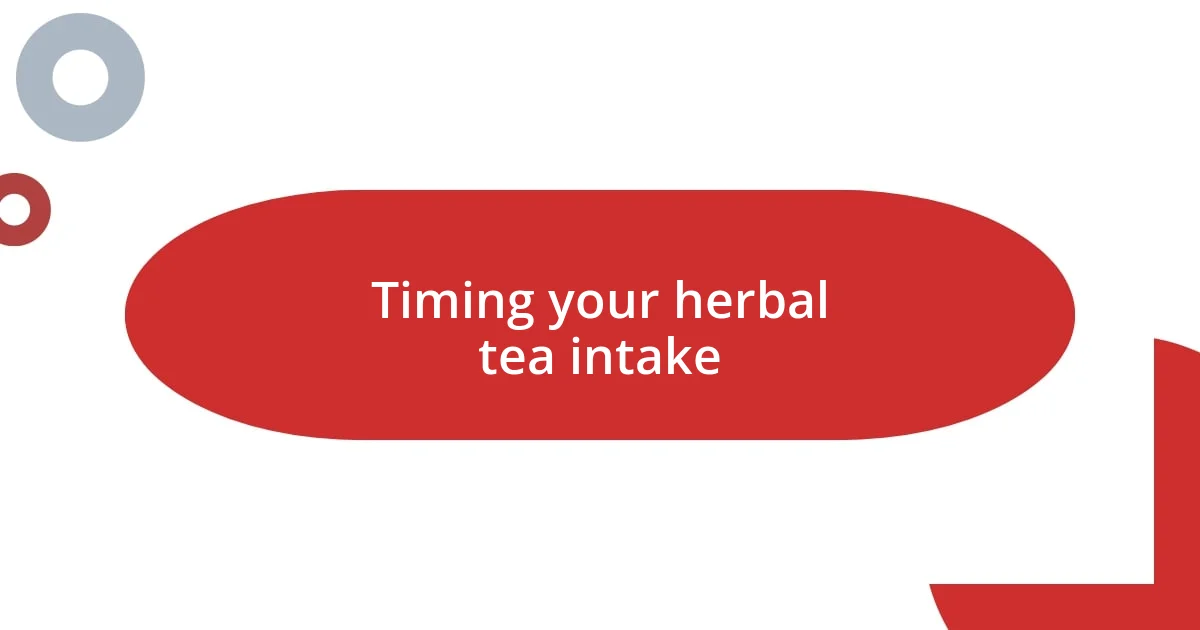
Timing your herbal tea intake
Timing your herbal tea intake is something I’ve come to appreciate as a key factor in enhancing the experience. For instance, I’ve found that sipping chamomile tea before bedtime significantly improves my sleep quality. There’s something calming about that warm cup in the evening, which gently signals my body to wind down after a hectic day. Have you noticed how certain teas seem to magically shepherd you into relaxation?
On the flip side, I often drink peppermint tea in the morning to kickstart my day. The refreshing aroma awakens my senses, while its gentle boost of energy prepares me for whatever lies ahead. I can’t help but think about how this small ritual serves as a delightful alternative to coffee. Isn’t it fascinating how the timing of these soothing beverages can transform our daily routines?
I’ve also learned that the right timing can enhance the health benefits of herbal teas. For example, I tend to enjoy ginger tea after meals as it aids digestion. The warmth spreads through me, alleviating any bloated feelings and leaving me feeling lighter. It’s a comforting reminder that sometimes, the simplest adjustments can have a meaningful impact on our well-being. Have you experimented with different timings for your herbal teas to find what works best for you?
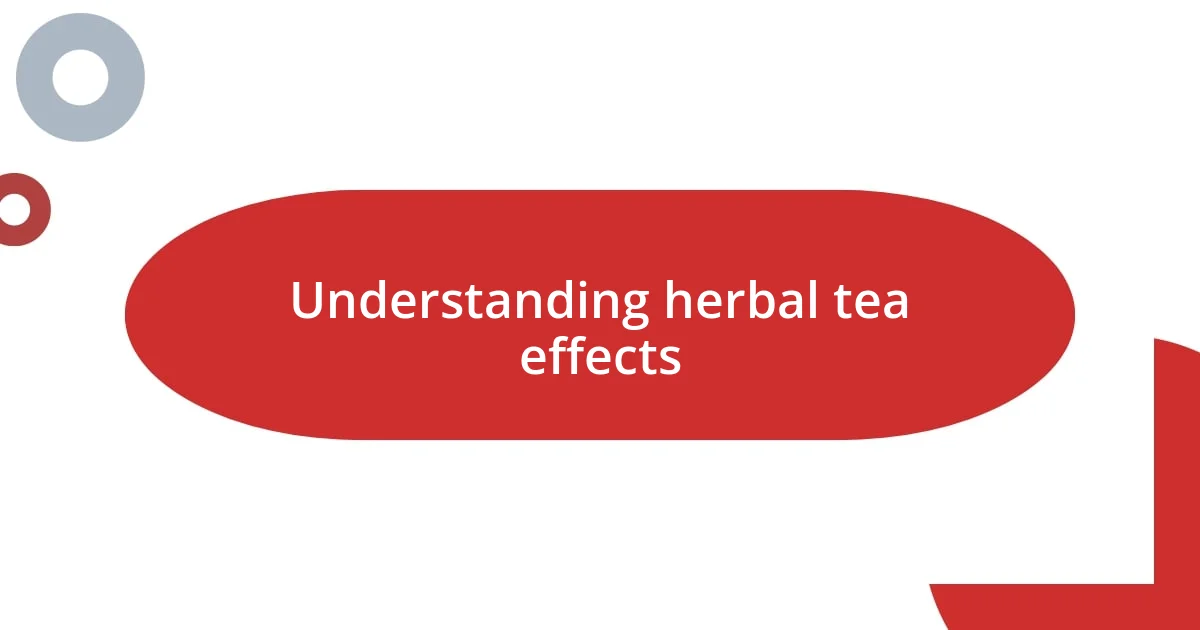
Understanding herbal tea effects
Understanding herbal tea effects can be quite fascinating. Each herbal infusion has its unique properties that resonate differently with our bodies and minds. For instance, when I brew lavender tea, I’m often swept away by its soothing aroma, which seems to melt away my stress. It never fails to amaze me how something as simple as a cup of tea can create such a calming atmosphere. Have you ever noticed the power of scent in your tea rituals?
Moreover, the effects of herbal teas can be deeply personal. I recall a time when I struggled with anxiety, and my friend gifted me a blend that included lemon balm. Drinking it felt like a gentle hug; it slowly eased my worries and provided a sense of peace. I genuinely believe that the right tea can offer more than just flavor — it can also provide support during tough times. What herbal tea has made a positive impact on your emotional well-being?
Honoring the body’s natural rhythms is another pivotal aspect of herbal tea’s effects. One chilly afternoon, I prepared an uplifting brew made of rooibos and vanilla. The rich, comforting flavors warmed me from the inside out. I felt energized yet relaxed, a perfect remedy against the grey skies outside. It’s intriguing how certain combinations can act like little bursts of happiness, even on the dullest days. Have you found a specific blend that delights your senses and lifts your spirits?
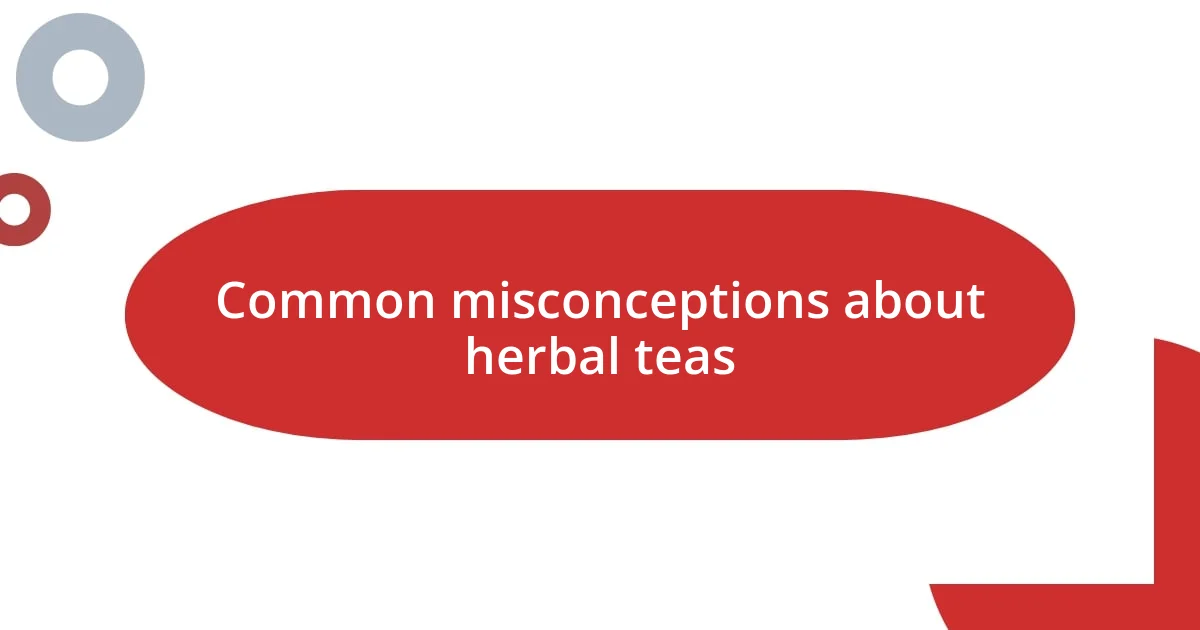
Common misconceptions about herbal teas
Many people believe that all herbal teas are caffeine-free, which isn’t always the case. Some blends incorporate ingredients like yerba mate or guayusa, which do contain caffeine. I remember a time when I reached for a fruity herbal tea, expecting it to be a calming choice, only to feel unexpectedly energized. It raised a few questions for me: Is caffeine an enemy in herbal blends, or can it play a role in enhancing certain teas? It’s vital to check the ingredients and know what you’re consuming.
Another common misconception is that herbal teas can replace medication. While I’ve personally experienced relief from ginger tea during cold season, it’s essential to understand that these brews can complement health but not substitute for prescribed treatments. Speaking from my experience, I’d often lean on herbal remedies when feeling under the weather, but I learned to balance this with professional guidance. Have you ever relied on a comforting cup to aid recovery? It’s crucial we don’t overlook the importance of medical advice in these scenarios.
Lastly, some may think that herbal teas are only for soothing ailments or offering relaxation. I’ve found that certain blends can actually boost creativity or focus, too. For instance, I used to sip on lemon ginger tea while brainstorming for a project, and it felt invigorating in a way that sparked new ideas. Have you noticed that different flavors can unlock different states of mind? It’s a delightful reminder that herbal teas can be versatile allies in our daily lives.










